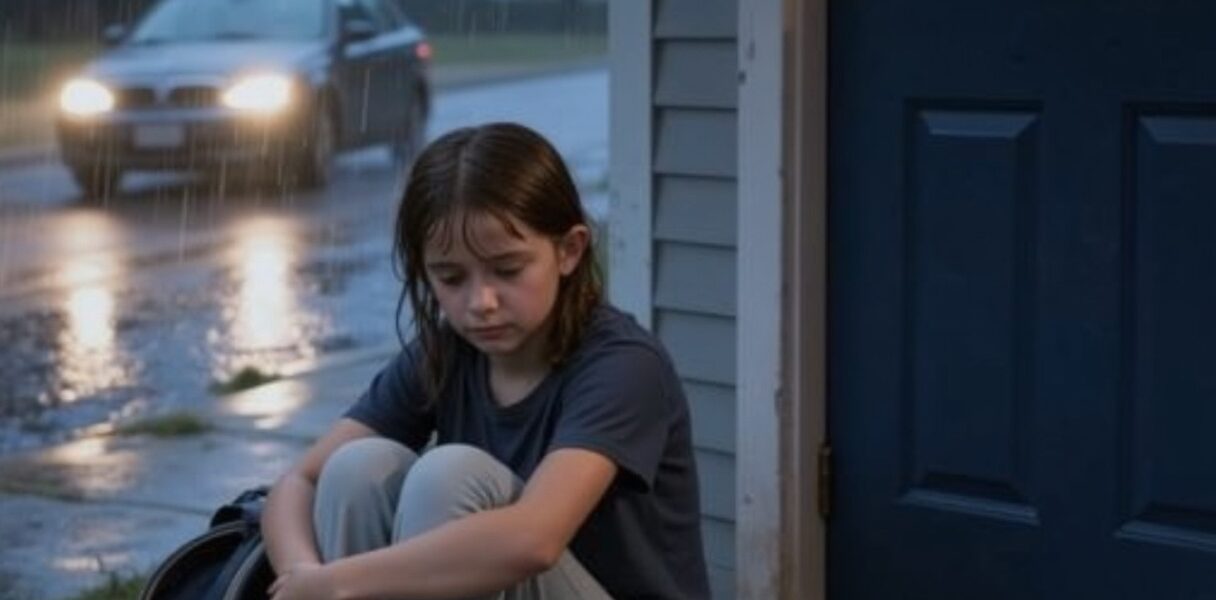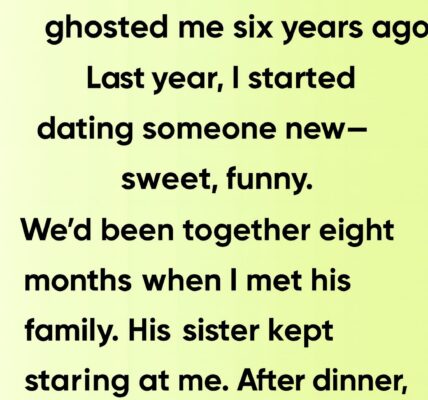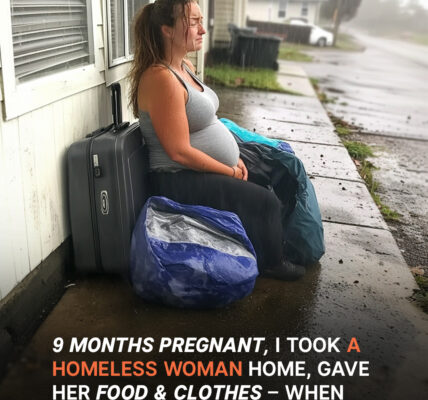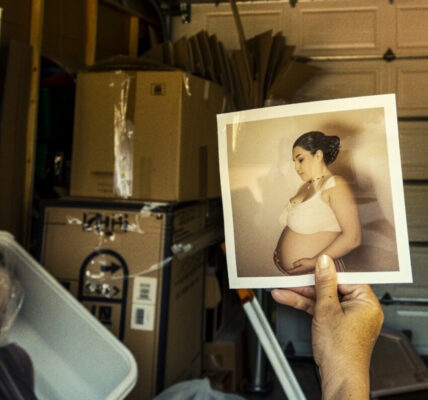My 11-year-old daughter came home, yet her key no longer fit the door. She waited for five hours in the rain — until my mother appeared and said coldly, “We’ve decided you and your mom don’t live here anymore.”
Under the flickering light of the hospital hallway, my phone buzzed again. I almost didn’t answer—it had been that kind of day—but when I saw Hannah’s name, I picked up. Her voice was small, shaking.
“My key doesn’t work,” she said. “It won’t go in. I think they changed the lock.”
My stomach tensed. “They?”
“Grandma. Maybe Aunt Brittany.”
That didn’t make sense. “They wouldn’t change the lock without telling me,” I said, pressing my fingers to my forehead.
She sniffled. “Can you come home?”
I glanced at the clock. Another hour left on my shift. “Honey, right now we’re swamped. Try calling Grandma or Aunt Brittany—they’re probably home.”
“I did,” she whispered. “No one’s answering.”
“Keep trying, okay? Someone will open the door soon.”
When I hung up, I told myself it was nothing. A mix-up. A misunderstanding. Hannah was eleven, sensitive, easily scared. But two hours later, when I checked my phone, I saw four missed calls and one text that made my heart stop:
Mom, I think they’re here. Please come.
I called her immediately. She picked up mid-sob. “Mom, they won’t let me in.”
My voice went sharp. “Who won’t?”
“Grandma. Aunt Brittany. Grandma said we don’t live here anymore.”
I froze.
“She told me to stop knocking. She said I’m being dramatic.”
Something cold and dark crawled up my chest. “Hannah, listen to me. Are you safe?”
“I’m under the porch light. It’s raining.”
“Stay right there. Don’t move. I’m coming.”
I didn’t ask for permission. I found my supervisor, words shaking. “My daughter’s locked out. Family emergency.” He opened his mouth to argue, but one look at my face shut him up.
Five minutes later, I was in my car, still in scrubs, hands trembling on the steering wheel as rain hammered the windshield. I wasn’t a nurse anymore. I was just a mother driving through a storm, terrified of what I might find.
By the time I reached the house, night had fallen. Hannah was huddled on the porch, soaked and shivering. I ran to her and wrapped her in my arms. She was freezing.
“I’m sorry,” she whispered.
“You have nothing to be sorry for,” I said, voice raw.
Then the porch light snapped on. The front door opened, and my mother appeared, holding a wine glass, her expression calm and almost amused.
“Elena,” she said. “What are you doing here?”
I stared at her. “You changed the locks.”
She sighed, like I was being unreasonable. “We needed privacy.”
“You locked my daughter out in the rain.”
“She’s fine. She’s eleven.” My mother tilted her head with that look she’d perfected—half pity, half scolding. “We’ve decided you and Hannah don’t live here anymore. It’s better this way. Less tension.”
“We?”
“Brittany and I.”
Behind her, my half-sister Brittany leaned on the doorframe, phone in hand, face painted with fake concern. “Mom, maybe this isn’t the best time,” she murmured.
“Oh, stop,” Mom snapped. “It’s been coming for a while. Elena, you’re an adult. You’ll manage.”
I looked past them. Brittany’s kids were sprawled on the couch, watching TV. My daughter’s blanket—the one with the daisies she’d sewn on herself—was folded neatly beside them.
Something inside me went very still. I didn’t yell. I didn’t cry. I just said, “Understood.”
Mom blinked. “What?”
“You heard me.” I took Hannah’s hand and walked back to the car.
We drove in silence. Rain filled the gaps between us. After a while, Hannah whispered, “Are we going to be okay?”
“Of course we are.”
“Grandma doesn’t like me, does she?”
The question hit like a blade. I forced a smile. “Grandma doesn’t like anyone, sweetheart. Don’t take it personally.”
She almost smiled. Then silence again. Heavier this time.
I wish I could say I was surprised, but you don’t get to be surprised when someone’s been teaching you who they are for years. You just finally start believing them.
This didn’t start tonight. It started decades ago.
There were four of us: Mom, Dad, Brittany, and me. Brittany was five years older—and ten times more loved. When she sneezed, Mom brought tissues and clapped like she’d cured a disease. When I sneezed, Mom told me to do it quietly.
Dad was a doctor, always working. When he was home, he smelled like antiseptic and exhaustion. He’d pat my shoulder, mumble something kind, then fall asleep in his chair. Still, he noticed me more than Mom ever did.
When I was nineteen, I met Hannah’s father. I mistook attention for love. A year later, I was pregnant. Two years later, he was gone. I remember staring at the positive test in one hand and my nursing school application in the other, wondering how to do both. Turns out, you just do. You work, you barely sleep, and you call crying in the break room “self-care.”
Three years ago, Dad retired. He wanted to make up for lost time. He came over every week with takeout and stories. Hannah adored him. Mom didn’t like that. Then he got sick—fast and final. Mom called one night, voice shaking. “He needs help. You’re a nurse.”
So Hannah and I moved in. I told myself it was temporary.
Those two years were the only time that house ever felt warm. I managed his meds, appointments, meals. Mom played hostess, pretending she was caring for him while sipping Chardonnay at noon. When Brittany visited, Mom lit up. The moment they left, the light died.
Then, three weeks ago, Dad passed. The funeral flowers hadn’t even wilted before Mom started redecorating. “Fresh energy,” she called it. She began with his room—painted it yellow, moved out his books, hung pictures of Brittany’s kids. Not one of Dad.
One night, I overheard her in the kitchen, whispering to Brittany. “Rent’s outrageous. You should move in full-time. Elena won’t stay much longer. She was only here for your father.”
I remember standing there, tea cooling in my hand, feeling like the air had vanished.
When I confronted her, she smiled like I was being dramatic. “You said you were just here for your dad. He’s gone. You have your own life now.”
A few days later, Dad’s lawyer, Jonathan Wells, called. “Just some paperwork,” he said.
When I arrived, he handed me a folder. “Your father put the house in a trust,” he explained. “He wanted it to stay with you and Hannah.”
“What do you mean ‘stay with me’?”
“It’s yours,” he said simply. “Your mother isn’t on the deed.”
I stared at the papers, not sure what to feel. Relief? Fear? All I could think was how fast grief turned into war.
I didn’t tell anyone. I wanted to find the right time. But five days later, Mom changed the locks.
By morning, the fear had turned to fire. I made two calls: one to my boss to take a few days off, and one to Jonathan Wells. “She changed the locks,” I said.
“Do you have the trust documents?”
“In my car.”
“Come here,” he said.
Ten minutes later, I was in his office. “This is clear-cut,” he said, flipping through the papers. “The property is legally yours. She has no claim.”
“Then fix it.”
“I’ll draft a notice.”
He typed while I stood by the window, trembling but steady. “Do you want to serve it yourself?”
I laughed bitterly. “No. I’ve had enough doors slammed in my face.”
He smiled slightly. “Understood.”
An hour later, we parked down the street from the house. Hannah was at a friend’s place. Jonathan walked up the driveway. Mom opened the door instantly—probably expecting a delivery. He handed her the papers. She rolled her eyes, read the first line, and froze. Brittany appeared, grabbed the papers, and started shouting. Jonathan said something calm and professional—probably a polite version of “You’re evicted”—then walked back to the car.
“Served,” he said.
On the drive back, I waited for satisfaction, but there was none. Just quiet relief. Like someone had finally stopped pressing on my chest.
That night, Jonathan called again. “She’s already hired a lawyer,” he said. “They’re accusing you of manipulating your father and fabricating the lockout.”
I laughed softly. “Taking care of your dying parent is manipulation now?”
“I’ll file for emergency possession,” he said. “The police report will help.”
That morning, I’d gone to the station to file one. The officer had listened carefully, then said, “She locked your daughter out in the rain? That’s neglect. You did the right thing.”
Jonathan attached it to the petition. The judge signed it two days later. The court denied Mom’s appeal before lunch.
“The sheriff’s office will enforce within the week,” Jonathan told me.
The morning it happened, the world felt weirdly calm. I woke early, made coffee, packed Hannah’s lunch, and sent her to school.
By ten, I was parked down the street again. Two sheriff’s deputies stood at the door. I stayed by the sidewalk, heart pounding.
Inside, shouting. Then the door flew open. Mom appeared, eyes wild. “She’s the one!” she screamed, pointing at me. “She forged everything!”
The deputy didn’t even look. “Ma’am, we have a court order.”
Brittany came up behind her, phone recording. “This is abuse! You can’t throw out a widow!”
The deputy read the order, calm and steady. “You have fifteen minutes to collect essential belongings.”
“Fifteen minutes?” Mom laughed like he’d told a joke.
He didn’t.
They started pacing, throwing things in bags. Brittany cried. Ryan, her husband, muttered about suing. Mom kept repeating, “This is my home.”
When the deputies stepped aside, Brittany stormed out with clothes and two framed pictures—one of her kids, one of Dad. Ryan followed, glaring. Mom came last. She stopped on the porch, staring at me, face hard and wet-eyed. “I hope you’re proud,” she said.
I wasn’t. I was just tired.
The deputies closed the door behind her. One turned to me. “Ma’am, it’s yours now.”
Three words. Heavier than I thought they’d be.
When they drove away, I stood in the drizzle, keys in hand, shaking. I went inside. The house smelled like dust and perfume. I opened all the windows. The rain smelled clean.
That evening, I picked Hannah up from school.
“Are we moving again?” she asked.
“Home,” I said.
When we walked inside, she ran from room to room, laughing. “It’s ours again,” she said.
“Yeah,” I whispered. “It always was.”
That was six months ago.
We haven’t heard from them since. I blocked every number. I still hear updates, though—small towns have long tongues. Apparently, Mom moved in with Brittany and Ryan after the eviction. That lasted a month before it all fell apart.
Mom redecorated their place without asking. Ryan exploded. She locked him out. The police came again. He left for good.
Now Mom and Brittany live together. From what I hear, they spend most days competing for control of the same house, the same air. Their latest fight spilled into Facebook comments—Mom listed Brittany’s dining set for sale, and Brittany replied, “You don’t even live here.”
Perfect symmetry.
As for us, things are quiet. Hannah helps me in the garden. She says plants grow faster when you stop shouting at them. I think she’s right.
The house feels different now. Not because it’s cleaner or quieter—but because no one’s waiting to take it away.
No more new locks. No more rain-soaked porches. No more pretending.
Just me and my daughter, finally home.




